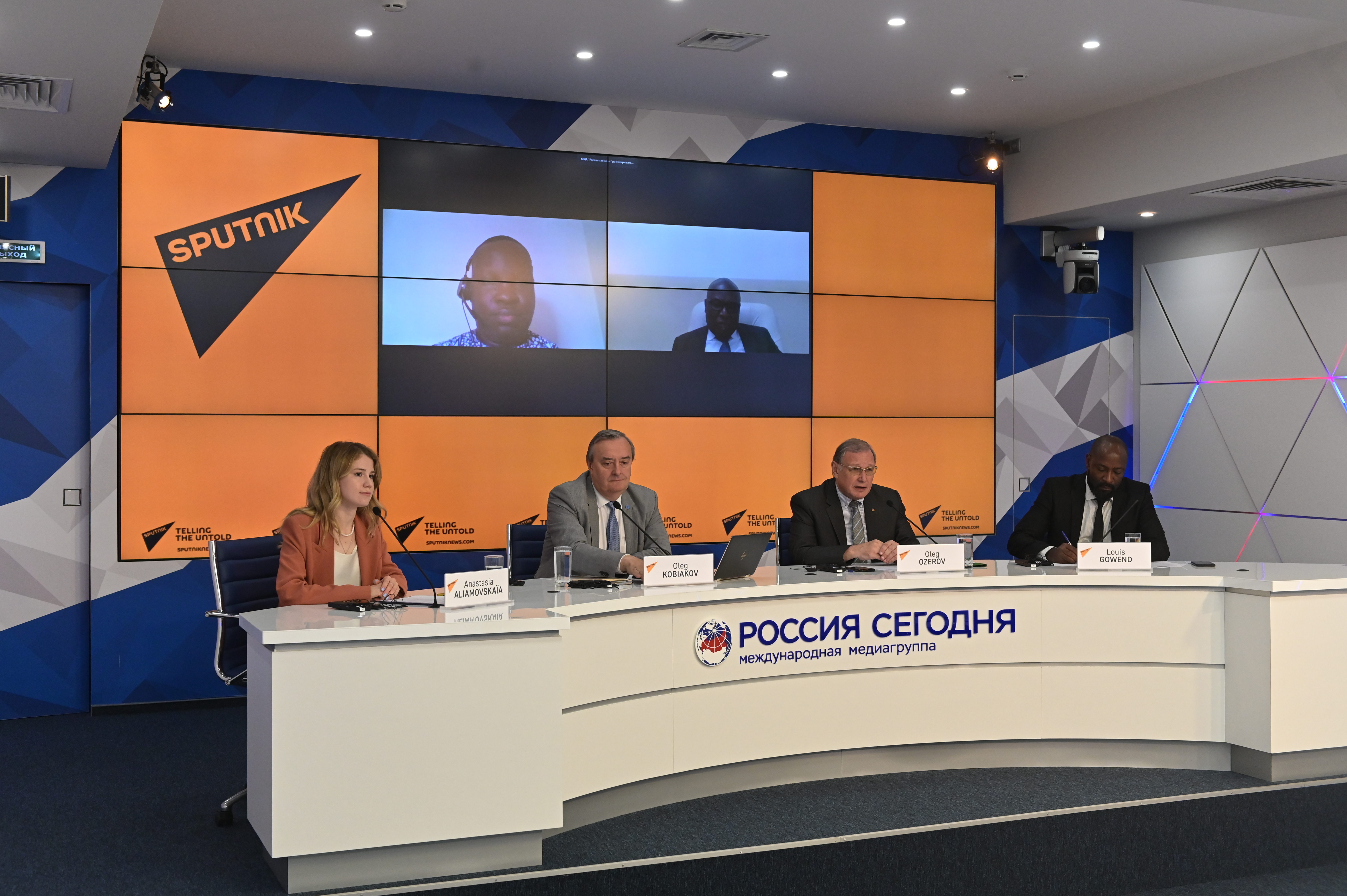ID :
635601
Wed, 07/13/2022 - 12:27
Auther :
Shortlink :
https://www.oananews.org/index.php//node/635601
The shortlink copeid
Rossiya Segodnya Hosts Virtual Conference Discussing Africa’s Food Security

The US and EU sanctions war against Russia targeting food and fertilizer exports, and constraints on Ukraine’s grains exports caused by the ongoing military crisis in that country have sparked fears of global food shortages and even the risk of famines in the developing world, especially in Africa.
Sputnik parent company Rossiya Segodnya held a virtual round table discussion on Tuesday between Russian and African diplomats, analysts, and officials to discuss the subject of "Global Challenges to Food Security."
Specialists discussed a range of topics related to the current food security crisis threatening the planet as it relates to both Africa and the wider world, including its origins, as well as the impact Western restrictions on Russia have had in exacerbating the emergency. The specialists also outlined ways to resolve the crisis.
Oleg Ozerov, Russian ambassador-at-large and head of the secretariat of Russia-Africa Partnership, emphasized that a consensus had formed among the international community that the current emergency came about long before the escalation of the crisis between the West and Russia over Ukraine in February.
“In the expert community there is a view that the hike in food prices is not accidental, and has the aim of creating a resource imbalance in the international division of labor with and moving toward a new stage of neo-colonial policy toward developing countries,” Ozerov said.
The West’s anti-Russian sanctions have served to create new food security problems for African nations, and the path toward resolving the crisis lies in removing “all the obstacles created by Western countries” to Russian-African cooperation in this field, he said.
The diplomat added that the West’s sanctions have targeted food in spite of assurances not to do so, with key Russian banks dealing in agricultural transactions, including with African countries, slapped with restrictions limiting their ability to carry out their operations.
Ozerov emphasized that food security will be a top priority topic for discussion at the upcoming Russia-Africa Summit and Economic Forum in St. Petersburg this fall.
Russia a Strategic Partner
Carlos Sardinha, ambassador and director for international cooperation at Angola’s Ministry of External Relations, highlighted Russia’s critical role in matters of his country’s food security, and expressed Luanda’s readiness to expand investment cooperation with the Russian agro sector, and to forge new private and public partnerships. Angola, Sardinha stressed, is not producing enough food domestically to meet the demands of the market, and forecasts have been made that the country will begin to face problems in the field of cereals in September.
“Here, of course, we want to take advantage of the long years of cooperation with the Russian Federation to cooperate in the area of food. Much can be done – we pin our hopes on Russian entrepreneurs who will see a strategic partner in Angola,” Sardinha said.
Oleg Kobiakov, director of the United Nations Food and Agriculture Organization’s Russian liaison office, warned that the current crisis is taking the planet away from the UN’s goals of sustainable development aimed at eliminating world hunger, and that even before the Ukraine calamity, the COVID crisis had resulted in widespread food insecurity for people in the developing world.
“According to statistics for 2021, the number of people suffering from hunger in the world reached 828 million, which is about 150 million more than in the pre-COVID year 2019,” Kobyakov explained. Other crises, including military conflicts in Africa and Asia, natural disasters, economic upheaval and rampant inflation caused by excessive money-printing, are other factors which helped bring about the current crisis, he said.
“Progress in this area is possible and requires concerted action by all UN member nations,” Kobiakov said, emphasizing that the FAO has proposed the creation of an international fund to support the export of food, fertilizers, and energy, particularly to support the interests of developing African nations.
New Russian Bank for Africa?
For his part, Louis Gouend, a representative of the Council of African Communities in Russia and president of the Cameroonian diaspora association in Russia, called for special attention to be paid to logistics, as well as investments for the appropriate trade infrastructure, and the possible creation of a new Russian bank specializing on Africa.
“Western banks have always been involved in financial settlements, and today all of these [links] have been ripped up. But I believe that this question is being solved, and one possibility, I think, would be to open a Russian bank in Africa,” Gouend said, adding that its creation could “significantly simplify settlements between countries.”
Finally, Mr. Cheta Nwanze, lead partner and head of research at SBM Intelligence, a Nigeria-based geopolitical affairs think tank, focused his remarks on the importance of Russian grain and fertilizers to Africa, pointing out that in the tropical climates which stretch across much of the continent, wheat grows either very poorly or does not grow at all.
Unfortuantely, Nwanze noted, “many” of Africa’s own agricultural transport companies have sought to avoid transporting grain and fertilizers from Russia, fearing Western reprisals in the form of secondary sanctions. In this light, “alternative supply corridors are needed, for example, through Iran,” he said.
“The world needs a more honest economic system, one that is not dictated by only one group of countries or people,” the researcher stressed.
Tuesday’s event was hosted by Anastasia Alyamovskaya, chief specialist of Rossiya Segodnya’s international cooperation directorate.
Read more: https://sputniknews.com/20220712/rossiya-segodnya-hosts-virtual-conference-discussing-africas-food-securityme-thinks-this-1097243173.html





